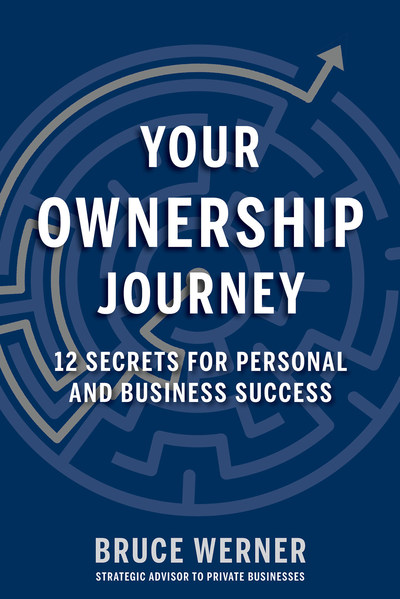CHICAGO, March 30, 2022 /PRNewswire/ — Most people don’t start a business to find happiness. But when they start to think about more than just making money, a business ownership strategy is a must for business and personal success.
"As we age, our priorities change due to what life hands us along the way," says business ownership expert Bruce Werner, author of Your Ownership Journey: 12 Secrets for Business and Personal Success (2022, Indie Books International). "At some point, when you have some financial security and have survived a few challenges, you start to think about happiness."
Werner spent the first half of his career at Werner Ladder, with executive responsibilities in all facets of the business. During that time, the family completed six acquisitions and sustained 10 percent annual growth for over a decade. The family later exited the business in a successful sale.
As an independent consultant, Werner helps owners address their governance, strategy, capital, talent, and succession issues. This work is based on several decades of deep operational experience. He has started and built businesses in finance, energy, retail, and technology, in addition to being a partner in a private equity fund.
"After working with business owners for many years, I’ve concluded that most business owners don’t understand the need to have an ownership strategy that’s separate from their business strategy," says Werner.
Werner says it all starts with a basic question: "Why are you in business?" Most owners don’t stop to dissect the question into its parts. What the question is asking is: What are your life goals—financial security, happiness, family harmony, enjoyment of time well spent—and how does the business help you achieve them?
"The business is an asset, and it should be used to help you achieve your life goals," says Werner.
The ownership plan should consider the stage that the business is at in its lifecycle.
"The business lifecycle consists of five phases: launch, growth, shake-out, maturity, and decline," says Werner. "It is easy to use revenue, profits, and cash flow to mark the transition between the phases."
The launch phase is associated with starting a new business. That means no revenue, a lot of costs, high risk, and uncertainty.
If the business gets traction, it moves to the growth phase. This is the exciting part of the lifecycle and what Silicon Valley made famous in its early days.
The shake-out phase is like being a teenager. It is not as much fun as being a kid; things start to go wrong sometimes and getting into trouble can change the course of your life. This means sales growth starts to slow, competition hurts profit margins, more investment is needed, and cash flow needs attention.
A business in its maturity is stabilized, generating cash flow, and may have a secure competitive position. However, it likely needs to evolve before it loses its competitive advantage. Productive reinvention is rewarded. Without it, decline sets in.
The decline phase marks the end of the productive years of the business. It will likely be sold or cease operations. The decline is always easier to see in hindsight and often missed while there is still time to fix the business.
"From that perspective, it is easier to define a process to help owners achieve their life and business goals," says Werner. "Where they are today is Point A. Where they want to get to is Point B. Once the two endpoints are defined, it is more straightforward to construct a road from A to B. Success is about perseverance and adapting to changes beyond your control."
As an independent consultant, Werner helps owners address their governance, strategy, capital, talent, and succession issues. This work is based on several decades of deep operational experience. He has started and built businesses in finance, energy, retail, and technology, in addition to being a partner in a private equity fund.
Werner has a specialty in working with family businesses, both as an advisor and as a board member. His governance experience includes forming new boards and serving on established boards, both advisory and fiduciary. He has performed audit, governance, and compensation committee work.
In the non-profit world, Werner has served as board chair and worked on governance, nominating, strategy, compensation, finance, and investment committees.
About Indie Books International
Indie Books International (www.indiebooksintl.com), founded in 2014 in Oceanside, California, has released more than 125 books. Similar to indie film companies and indie music labels, the mission of Indie Books International is to serve as an independent publishing alternative to help business thought leaders create impact and influence.
Contact
Henry DeVries
333043@email4pr.com
619-540-3031
SOURCE Bruce Werner



